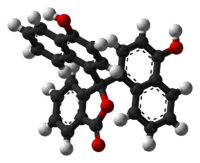Naphtholphthalein
 | |
 | |
| Names | |
|---|---|
| IUPAC name
3,3-bis(4-hydroxynaphthalen-1-yl)-2-benzofuran-1-one | |
| Other names
1-Naphtholphthalein, alpha-naphtholphthalein, naphtholphthalein blue | |
| Identifiers | |
| 3D model (JSmol) |
|
| 97816 | |
| ChemSpider | |
| ECHA InfoCard | 100.008.979 |
| PubChem CID |
|
| |
| Properties | |
| C28H18O4 | |
| Molar mass | 418.45 g·mol−1 |
| Appearance | Colorless-reddish to blue-green solid |
| Melting point | 238–240 °C (460–464 °F; 511–513 K) [1] |
| Insoluble | |
| Hazards | |
| Main hazards | Irritant |
| GHS pictograms |  [1] [1] |
| GHS signal word | Warning |
| H315, H319, H335[1] | |
| P261, P305+351+338[1] | |
| Except where otherwise noted, data are given for materials in their standard state (at 25 °C [77 °F], 100 kPa). | |
| | |
| Infobox references | |
α-Naphtholphthalein (C28H18O4) is a pH indicator with a visual transition from colorless/reddish to greenish blue at pH 7.3–8.7.
| Naphtholphthalein (pH indicator) | ||
| below pH 7.3 | above pH 8.7 | |
| 7.3 | ⇌ | 8.7 |
References
This article is issued from
Wikipedia.
The text is licensed under Creative Commons - Attribution - Sharealike.
Additional terms may apply for the media files.